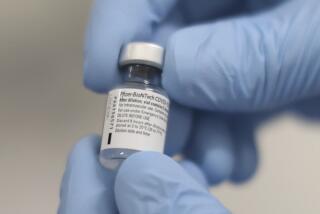Large-Scale Tests of AIDS Vaccine Sought
- Share via
STOCKHOLM — A French scientist who has injected himself with a test AIDS vaccine said Wednesday that he hopes to launch a large-scale clinical trial of a similar vaccine in Africa and Europe “by the end of the year.”
In a presentation at the fourth international conference on AIDS, Dr. Daniel Zagury, of Pierre and Marie Curie University in Paris, provided no details of his plans. He also acknowledged that he had not yet developed a test vaccine suitable for administration to perhaps hundreds of individuals.
The French immunologist has emerged as a maverick figure in research on the acquired immune deficiency syndrome, because of his self-experimentation and what colleagues describe as a passionate commitment to speed up the pace of vaccine development.
Large trials that would involve individuals at high risk for exposure to the human immunodeficiency virus are “not tomorrow” but “I hope it would be by the end of the year,” Zagury told reporters. “Such an operation requires many constraints that we must overcome.”
Self-Experimentation
By comparison, most other vaccine researchers have emphasized a more deliberative approach, which restricts initial human trials to individuals at low risk of actually being exposed to the virus.
At the meeting, Zagury described his widely publicized self-experimentation. The experiments show that he has boosted his immunity against the AIDS virus by a series of self-injections of a test vaccine.
There is no way of knowing whether Zagury is actually protected against infection with the virus because he has never been exposed to it. In addition, the exact approach he tested on himself has apparently not been tested in others. Nor has it been shown to protect chimpanzees against exposure to the virus.
Caution Urged
Another leading vaccine researcher said he understood the impatience of Zagury to push onward but felt a more cautious approach was prudent. “I cannot imagine a large-scale trial (this year),” said Dr. Dani P. Bolognesi of Duke University, who has collaborated with the French scientist on vaccine research.
Bolognesi added: “I think we are closer to a vaccine because we have learned what doesn’t work, and we know more about the virus . . . (but) nobody ought to get carried away with anything.”
In another development at the meeting, a leading authority on AIDS and intravenous drug users said he was encouraged by new data showing the percentage of viral infection had remained constant for several years in New York City and San Francisco as well as in Stockholm.
Don C. Des Jarlais of the New York state Division of Substance Abuse Services said the stable rate showed that expanded educational and treatment programs had a chance to “greatly reduce the rate of new HIV infections among the intravenous drug users.”
In San Francisco, he said, 15% to 20% of cocaine and heroin abusers have been infected with the virus, but that figure has not increased for about 18 months, he said.
In New York, 55% to 60% of the drug abusers are infected, and that figure has been stable for about three years, he said.
But Des Jarlais cautioned that other factors such as the association between cocaine use and HIV exposure and high infection rates in minority groups could still confound the control efforts.
More to Read
Sign up for Essential California
The most important California stories and recommendations in your inbox every morning.
You may occasionally receive promotional content from the Los Angeles Times.













